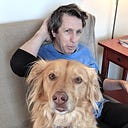The Creative Faculty
One day a few years ago I was “watching” myself paint and recall a moment when my hand was suspended over my palette table for a moment before sinking the spatula into a pile of cobalt blue. There wasn’t a particular color constraint to that decision. At that moment I could have as easily scooped up nickel yellow or mars violet. How did I decide? It wasn’t random. What did the deciding? I don’t know.
The dynamic by which we bring new works of art into the world is a multifaceted one, involving the intellect, emotions, intuition, and the body, coming together amongst hundreds or thousands of decisions and past experiences to produce a physical object. The creative process itself is so complex and rich with the possibility of discoveries that for all our intent, desire, and labor, we almost always — if we are lucky — finish with something that could not have been premeditated. Something that is, by virtue of being beyond complete preconception, more interesting, subtle, perhaps alien, and moving than what we might have hoped for. John Ashbery had a bit to say about this in his poem, Self Portrait in a Convex Mirror. A section here:
This always
Happens, as in the game where
A whispered phrase passed around the room
Ends up as something completely different.
It is the principle that makes works of art so unlike
What the artist intended. Often he finds
He has omitted the thing he started out to say
In the first place. Seduced by flowers,
Explicit pleasures, he blames himself (though
Secretly satisfied with the result), imagining
He had a say in the matter and exercised
An option of which he was hardly conscious,
Unaware that necessity circumvents such resolutions.
So as to create something new
For itself, that there is no other way,
That the history of creation proceeds according to
Stringent laws, and that things
Do get done in this way, but never the things
We set out to accomplish and wanted so desperately
To see come into being.
What does this say about the agency of the artist? Is there not something lost in the idea of ceding a certain kind of control over the outcome? What to make of days when you are simply the lucky recipient of a visitation, as Ranier Maria Rilke apparently was when he wrote some 60 sonnets and a bunch of elegies in a mad month of February in 1922? Annie Dillard famously described the feeling her essay “Write Till You Drop,”
“One line of a poem, the poet said — only one line, but thank God for that one line — drops from the ceiling…It is like something you memorized once and forgot. Now it comes back and rips away your breath. You find and finger a phrase at a time; you lay it down as if with tongs, restraining your strength, and wait suspended and fierce until the next one finds you: yes, this; and yes, praise be, then this.”
The creative impulse is renegade, and domesticates poorly. The more it is bridled by dogma or scholastic strategizing, the more bloodless the results will be. Ambition can quickly go from being a salutary impetus to an enemy, as you size up a work in process against some cheap and illusory specter of achievement or progress. That road goes nowhere worth going to my mind.
There is plenty of space for cognitive processing, evaluation, and editing in the making of a painting. No work is complete without it. But I’m talking here about a deeper choice, a finding of a deeper motivation and direction and following it. The relinquishing of certain control demanded in yielding to the unknown is often scary for me. Every time I begin again I wonder: Can I still do this? Are my technical skills up to it? Will my imagination come through anew, or will I be fortunate enough to get again that invisible tap on the shoulder, “Look over here,” or “Try this…”? It’s not in my nature to allow my intellect to release its grip on an endeavor of consequence. That’s been a battle over the years, but that’s another story. In the end, I have a reverence for the creative faculty, a deeply mysterious and (I think) noble quality of the human animal, and I’ve learned from three decades of experience that my painting is better if let it have its way as much as I can.
